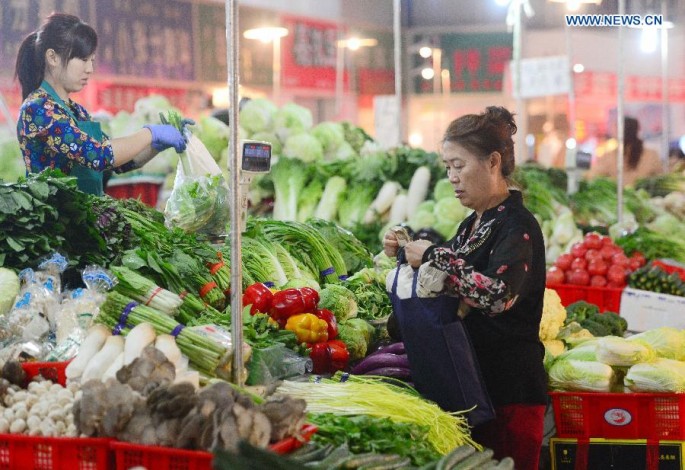China’s consumer inflation eased in September, while producer prices dropped for the 43rd consecutive month, leading to speculation that the government may inject more monetary stimulus to the economy to revitalize demand and growth in the country.
The Consumer Price Index (CPI), which measures inflation, rose by 1.6 percent in September, compared with the previous year, down from 2.0 percent for the past month, the National Bureau of Statistics (NBS) posted on Wednesday. It was also below the 1.8-percent increase forecast in a recent Reuters poll.
According to the NBS, the Producer Price Index (PPI), the main gauge of wholesale prices in the market, dropped by 5.9 percent in September from the same period in 2014, the same level as in August this year. The decline continued to its 43rd straight month as producers cut the prices of their products due to weak consumer demand.
On a monthly basis, the PPI contracted by 0.4 percent by the end of September, compared with a 0.8-percent decline for August.
Senior NBS statistician Yu Qiumei said on Wednesday that the inflation rate was "relatively high" in Sept. 2014, which reflected against the CPI growth for September this year by making it appear weak.
The NBS data indicated that food prices in September went up by 2.7 percent compared to the same period in the past year, dropping from 3.7 percent in August.
Pork prices, another key inflation indicator in China, eased from the previous month's 19.6-percent increase to 17.4 percent in September.
"The pork and vegetable price fluctuation has dragged up August's CPI. As those prices stabilized in September, the inflation rate also eased to a certain extent," Xu Gao, chief economist at China Everbright Securities, told the Global Times newspaper.
The increase in fresh vegetable prices cooled down from 15.9 percent in August to 10.4 percent in September.
Zhang Liqun, a macroeconomics research fellow at the Development Research Center of the State Council, also told the Global Times that the CPI for September indicated a generally "stable trend."
September's CPI went up by 0.1 percent compared with August.
The government should not "lower its guard," said Zhang, adding that food prices should be kept at a stable level.
In contrast, Lu Zhengwei, chief economist at Industrial Bank, said that the lower-than-expected September inflation rate should be looked into.
"In September, when there are two national holidays, people usually spend more. But a large part of this consumption is done abroad, and this reflects the problem of the yuan's overvalued exchange rate," Lu told the domestic finance news portal ce.cn on Wednesday.
The inflation rate has a chance of rising slightly in the coming months, although the average increase in 2015 is unlikely to go beyond 2 percent, according to a report from the Bank of Communications.
However, Zhang said that the PPI data indicated continued industrial inflation pressure in the Chinese market, warning that the country urgently needs to up its domestic demand.
"The government has rolled out a series of measures to stimulate domestic demand, and it's important that those policies are properly carried out," he said.
The Bank of Communications report also said that the PPI's negative growth is not expected to change in 2015, but that the situation could prompt local industries to speed up upgrades.
The CPI and PPI data follow the weak import data released on Tuesday, further indicating the continued downward pressure on the Chinese economy.
Imports fell by 17.7 percent in September this year, compared to the same period in 2014.
Zhang said that under the current state of the economy, the government is likely to impose additional fiscal stimulus measures in the fourth quarter of this year.
The government might lower banks' reserve requirement ratio (RRR), the minimum level of reserves banks must hold, in the next few months, said Xu, although noting that it is unlikely that further cuts will be made against benchmark rates because they are already relatively low.
The People's Bank of China, China's central bank, has previously cut both benchmark interest rates and the RRR four times in 2015.



























